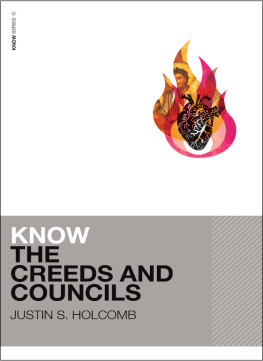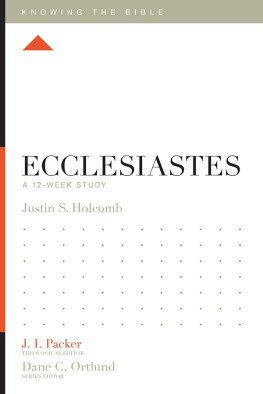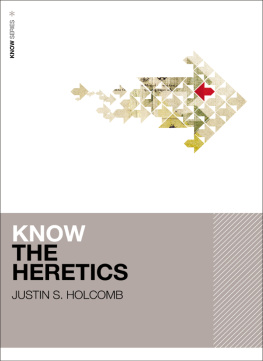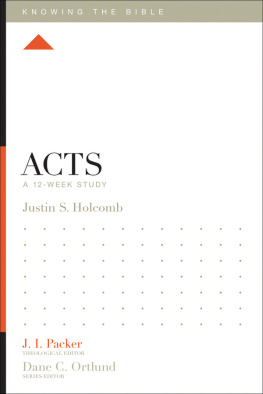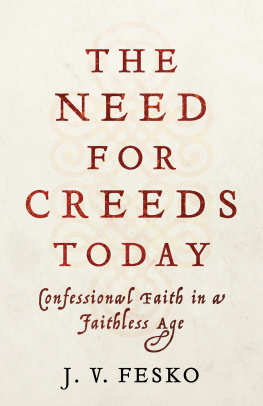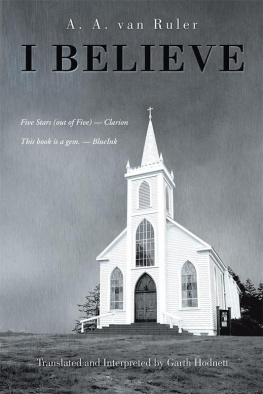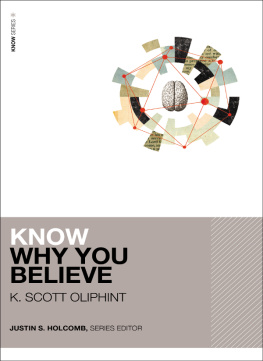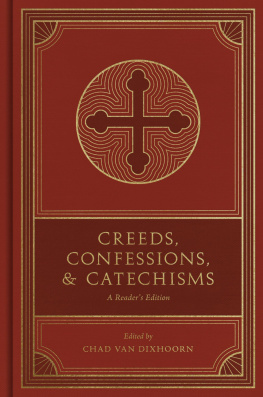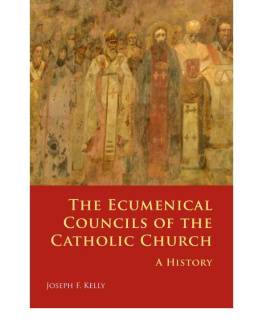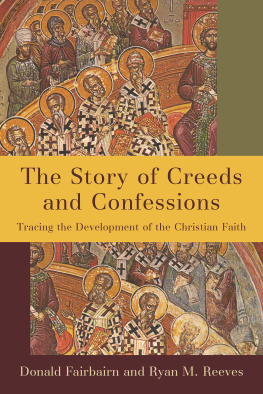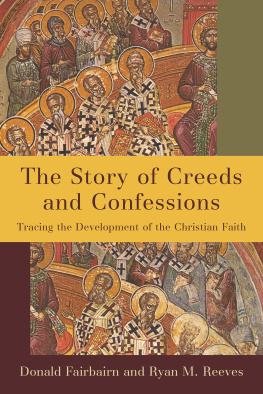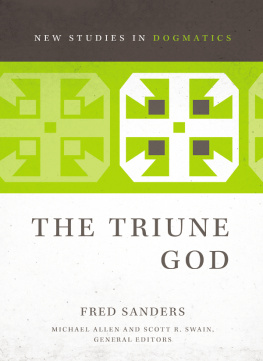These books will make super resources for Sunday school classes, for thoughtful church leaders, and indeed for all Christians who want to take their faith, and its ecumenical history, seriously.
C ARL R. T RUEMAN , Paul Woolley Professor of Church History,
Westminster Theological Seminary, PA
Faithful wisdom through the centuries needs to be explored for our own engagement with Scripture today. It takes a gifted scholar to survey these sources well, and a gifted teacher to communicate them to the person in the pew. Justin Holcomb is that sort of scholar-communicator.
M ICHAEL H ORTON , J. G. Machen Professor of Systematic Theology and Apologetics, Westminster Seminary, CA; author, The Christian Faith
I welcome the Know series as an important companion in our lifelong quest to know God better.
C AROLYN C USTIS J AMES , author, When Life and Beliefs Collide
The Know series gives local leaders and churches short, succinct, accurate, theologically informed, and relevant sketches of big topics in theology. Pastors and professors will discover they are unable to keep students from these volumes.
S COT M C K NIGHT , author, King Jesus Gospel
Jesus promised that the Spirit would lead the church into truth. That means that history matters. These concise books from Justin Holcomb are invitations into that history, to see how the Spirit led the church to articulate the orthodox Christian faith and how that scriptural imagination helped them discern errors and wrong turns. We need this wisdom more than ever in our postmodern moment.
J AMES K. A. S MITH , Gary and Henrietta Byker Chair in Applied Reformed Theology and Worldview, Calvin College; author, Letters to a Young Calvinist and Desiring the Kingdom
I applaud the Know series in its effort to equip the saints; I encourage pastors and laypeople alike to diligently read these books.
J AMES H. G ILMORE , coauthor, The Experience Economy
Books in the Know Series
Know the Creeds and Councils
Know the Heretics
ZONDERVAN
Know the Creeds and Councils
Copyright 2014 by Justin Holcomb
Requests for information should be addressed to:
Zondervan, 3900 Sparks Drive SE, Grand Rapids, Michigan 49546
ePub Edition October 2017: ISBN 978-0-310-51510-4
All Scripture quotations, unless otherwise indicated, are taken from The Holy Bible, New International Version, NIV. Copyright 1973, 1978, 1984, 2011 by Biblica, Inc. Used by permission. All rights reserved worldwide.
Any Internet addresses (websites, blogs, etc.) and telephone numbers in this book are offered as a resource. They are not intended in any way to be or imply an endorsement by Zondervan, nor does Zondervan vouch for the content of these sites and numbers for the life of this book.
All rights reserved. No part of this publication may be reproduced, stored in a retrieval system, or transmitted in any form or by any means electronic, mechanical, photocopy, recording, or any other except for brief quotations in printed reviews, without the prior permission of the publisher.
Cover design: Gearbox
Interior composition: Greg Johnson/Textbook Perfect
14 15 16 17 18 19 /DCI/ 20 19 18 17 16 15 14 13 12 11 10 9 8 7 6 5 4 3 2 1
Information about External Hyperlinks in this ebook
Please note that footnotes in this ebook may contain hyperlinks to external websites as part of bibliographic citations. These hyperlinks have not been activated by the publisher, who cannot verify the accuracy of these links beyond the date of publication.
CONTENTS
by Thomas C. Oden
Why try to understand the councils? We learn something important from them: how the teachings of the prophets and apostles were consensually received by comparing Scripture to Scripture to grasp the meaning of the whole narrative of the history of salvation.
These conciliar decisions have been tested again and again, and have continued to be confirmed by the consent of believers. They reassure us that we can trust the understanding of Gods revelation in Scripture that has been held to be true by the whole worldwide church throughout changing cultures of all times and places. These conciliar decisions have been hammered out by intense examination of Scripture when nonconsensual opinions have been asserted. We learn from them those teachings that the ancient Christian consensus has confirmed as true apostolic teaching.
In Know the Creeds and Councils, Justin Holcomb accurately summarizes key points of the most crucial, contested issues of scriptural understanding, drawing readers today closer to the truth of classic Christianity.
T HOMAS C. O DEN
First of all, a special thanks to Jeffrey Haines for his superb research assistance and editing. Much gratitude for those who also assisted with research: Jordan Buckley, James Gordon, Jonathan Arnold, Tim McConnell, and Michael Stell.
I would like to thank Donald Prudlo for his suggestions on the chapters on the Council of Trent and the Second Vatican Council.
At Zondervan, I would like to thank my editor, Madison Trammel, who supported the book and series marvelously.
Tradition is the fruit of the Spirits teaching activity from the ages as Gods people have sought understanding of Scripture. It is not infallible, but neither is it negligible, and we impoverish ourselves if we disregard it.
J. I. Packer, Upholding the Unity of Scripture Today
Obviously, Christianity did not begin when we were born. Nor did our generation invent Christian thought. We live two thousand years removed from the time of our founder, and for better or for worse we are the recipients of a long line of Christians insights, mistakes, and ways of speaking about God and the Christian faith. Todays Christianity is directly affected by what earlier Christians chose to do and to believe.
The fact that Christianity developed that the sixteenth century, for instance, looked very different from the third, and that both looked very different from the twenty-first can sometimes lead us to wonder what the essential core of Christianity is. As a result, some people decide to ignore history altogether and try to reconstruct real Christianity with nothing more than a Bible. But this approach misses a great deal. Christians of the past were no less concerned with being faithful to God than we are, and they sought to fit together all that Scripture has to say about the mysteries of Christianity the incarnation, the Trinity, predestination, and more with all the intellectual power of their times. To ignore these insights is to attempt to reinvent the wheel, and to risk reinventing it badly.
The main difficulty is untangling the language of the church of the past, particularly for those of us who do not have time or energy to devote to historical studies. The goal of this book is to guide readers past that difficulty and to provide an overview of the main historical developments in Christian thought. It is not intended to be a comprehensive guide to all creeds, councils, confessions, and catechisms; that would take nothing less than an encyclopedia. However, I hope that after reading this book you will come away with a deeper and better understanding of how the church has wrestled with what continue to be the most important questions about Christian belief.
The chapters are brief and to the point. For each creed, confession, catechism, or council, I present historical background, a short summary of the content, and thoughts on contemporary relevance. At the end of each chapter are discussion questions and recommended reading for further study.

